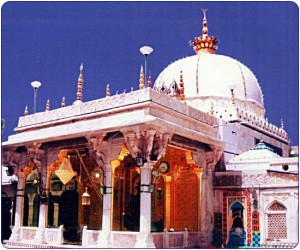Chishtism – The Way Forward For Humanity: By Aisha Chishti, Global Sufi Centre, Ajmer Shareef
Chishtism – The Way Forward For Humanity: By Aisha Chishti, Global Sufi Centre, Ajmer Shareef
In India, you will never see anyone other than Hindus in a temple or anyone other than Christians in a church and likewise anyone other than Muslims in a masjid. But you will find a unique peculiarity when it comes to the shrines of Sufi Saints in that you will see devotees from all religious and ethnic backgrounds in attendance. It’s a truly humbling sight to behold. There is plenty of talk in India today of secularism and Hindu-Muslim brotherhood but if there is a place where these ideals have actually materialized, it is the Dargah (Shrine) of a Sufi saint. It’s an open testimony that if there has ever been someone who has succeeded in establishing communal harmony in India, it has been the Chishti Sufi saints of old.
Chishtism is a Sufi/Islamic mystical movement that traces its origins back to Ali bin Abu Talib. It has a deep rooted, widespread presence in the Indian subcontinent. Chishtism got its true glory from the efforts of its greatest benefactor Khwaja Moinuddin Hasan Chishti Sanjari Habeeb Allah, whose Shrine is located in Ajmer, India. Where all else seems to have failed, the centuries old Sufi slogan of “love for all, malice towards none” has succeeded in uniting the diverse cultures of India. Be it the Shrine of Salim Chishti (RA) or Sabir Piya (RA) in northern India or Nizamuddin Auliya (RA) and Khwaja Qutubuddin (RA) in Delhi or Baba Fareed (RA) and Lal Shahbaz Qalandar (RA) in Pakistan, there are several thousand such Shrines all across the Indian subcontinent and you will witness one common facet, which is, be it knowledge, worldly blessings or a spiritual connection with God, every seeker/visitor has his wishes fulfilled at the Shrines of these Chishti Sufis. Some come here for the cure of diseases, others for relief from the trials of life and by the grace of these Sufi Saints, return with the fruition of all of their aspirations.

Chishtism is firmly based on 4 pillars, namely:-
1) Mohabbat (Love) – this is the most important pillar of Chishtism. Love, tolerance, inclusiveness and universal brotherhood are the driving force of this ideology.
2) Tark (Abstinence) – Chishtism shun materialism. Although such abstinence can be seen in monks and missionaries too for example, what makes Chishtism the most superior ideology is that for the disciplining of the self (nafs/desire), Chishtis practice willful abstinence from the unforbidden, which is a higher practice than abstaining from what is forbidden upon them, as seen in monks in for example.
3) Eesaar (Sacrifice) – What better personification can there be for the trait of “eesaar” than Hussain (AS), the son of Ali (KWK), who laid down not only his only life, but also sacrificed his sons, nephews and other close ones and gave up every worldly comfort and possession, in order to uphold the morals of truth and justice against the tyrant ruler Yazid.
4) Inkisaar (Humility) – As a hallmark of their infallibility, Chishti saints shun association with rulers/authoritative powers. Khwaja Bayazid Bastami (RA), a prominent Sufi scholar of Baghdad in the 9th century AD, was highly respected by the ruler of his time. Once, as the ruler was paying his respects to the Saint, he suddenly spat on the face of the king. In a fit of rage, the king slapped the Saint, to which the Saint smiled and addressing his “self”, he said “hope you enjoyed that slap”. It is human nature to feel a sense of gratification when a fellow human pays respect to you and if the one paying respect is the ruler of the state, then we can well imagine the condescension and vanity that our inner self indulges in. That is why Khwaja Bayazid incited the ruler to slap him, in order to mortify his own inner self.

Although several thousand members of the Indian society have converted to Islam at the hands of Chishti Sufis, especially since the arrival of Khwaja Moinuddin Chishti Habeeb Allah into India, which has resulted into the formidable 80 million Muslim populace in the Indian subcontinent today, Chishtis as a rule refrained from the practice of giving daawat (invitation) to Islam. They welcomed people to their threshold without discrimination based on class, creed or religion. It was their sheer khuloos (excellence of character) that inspired people to convert to Islam, just as Prophet Muhammad’s (peace be upon him) did. One such incident occurred when a Jewish woman in Makkah, who, out of resentment for the Prophet of Islam, used to throw garbage in his way every day from her rooftop, fell sick. The Prophet would carry on, on his way without the slightest hint of complaint. On that particular day, upon finding the woman absent from her rooftop, he went into her house to enquire about her. Upon seeing Prophet Muhammad (peace be upon him), the woman was deeply ashamed and said to him, “You probably didn’t realize, I’m the same woman who throws garbage upon you every day”. Smiling, Prophet Muhammad (peace be upon him) said, “I’m aware of that. But what you do is your character and what I’m doing is mine.” So moved was the woman by the nobility and forbearance of the Prophet’s character that she immediately embraced Islam.
Another salient practice among Chishtis which is especially crucial in today’s times of religious sectarianism, is their refrainment from debate and argument. The charisma of Chishtis, unlike the godmen of today, lay in their lack of assertiveness and in their sheer approachability. It’s a practice handed down from the 11 Imams (11 generations of descendants’ of Ali who were the Spiritual Leaders of Muslims) that have passed, led by Ali ibn Abu Talib. The scope of establishing world peace lies only within such strong values, as exhibited by Chishti Sufis who taught that a Hindu is not a Hindu and a Muslim is not a Muslim without kindness, compassion and humanity. The evils of terrorism and communal distrust, which have majorly emerged over the last 50-60 years, coinciding with the decline of Chishtism, can only be fought with the Chishti formula of peace and brotherhood. It is high time that humanity reunite under the banner of Chishti Sufis, and establish a new world order of peace for all mankind.




